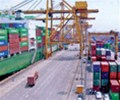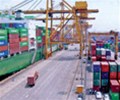

Firming up a strategic deal at the Colombo Port in Sri Lanka, the Adani Group will on Thursday sign a build-operate-transfer (BOT) agreement with its local partner John Keells Holdings and the Sri Lanka Port Authority (SLPA), to jointly develop its West Container Terminal (WCT).
While the Adani Group has been in talks with John Keells, one of the largest conglomerates in Sri Lanka, on aspects of design and a probable timeline for execution, Thursday’s agreement among all three stakeholders will bear details of the execution of the project, officials in Colombo, who are familiar with the negotiations, told The Hindu. The signing event is to be held virtually.
Earlier this year, President Gotabaya Rajapaksa announced the involvement of the Adani Group in the WCT, after controversially ejecting India and Japan out of the East Container Terminal (ECT) project, following resistance from trade unions and sections of Buddhist monks who objected to “foreign involvement” in national assets. The cancellation of the tripartite agree- ment on the ECT project was a major cause of strain in bilateral ties, with New Delhi voicing concern over Colombo reneging on a commitment made in 2019. Tokyo too expressed displeasure.
Colombo pitched the WCT project as a “compromise”, while the Indian role in the WCT project, through investment from Adani Group, is said to be “strictly private sector”, unlike the proposed ECT that entailed governmental involvement.
Confirming the project in a tweet in March 2021, Adani Group chairman Gautam Adani had said: “Grateful to the leaders of GoI, GoSL, SLPA & John Keells for the opportunity to build WCT, Colombo. This partnership is a symbol of the deep strategic relations between cou- ntries with great intertwined history. It will launch decades of container growth.”
In addition to the obvious strategic significance of the Colombo Port in the Indian Ocean, the popular argument from the Indian side for investing in it has been that over 70% of the transhipment business at the Colombo Port is linked to the Indian market.
Source: The Hindu